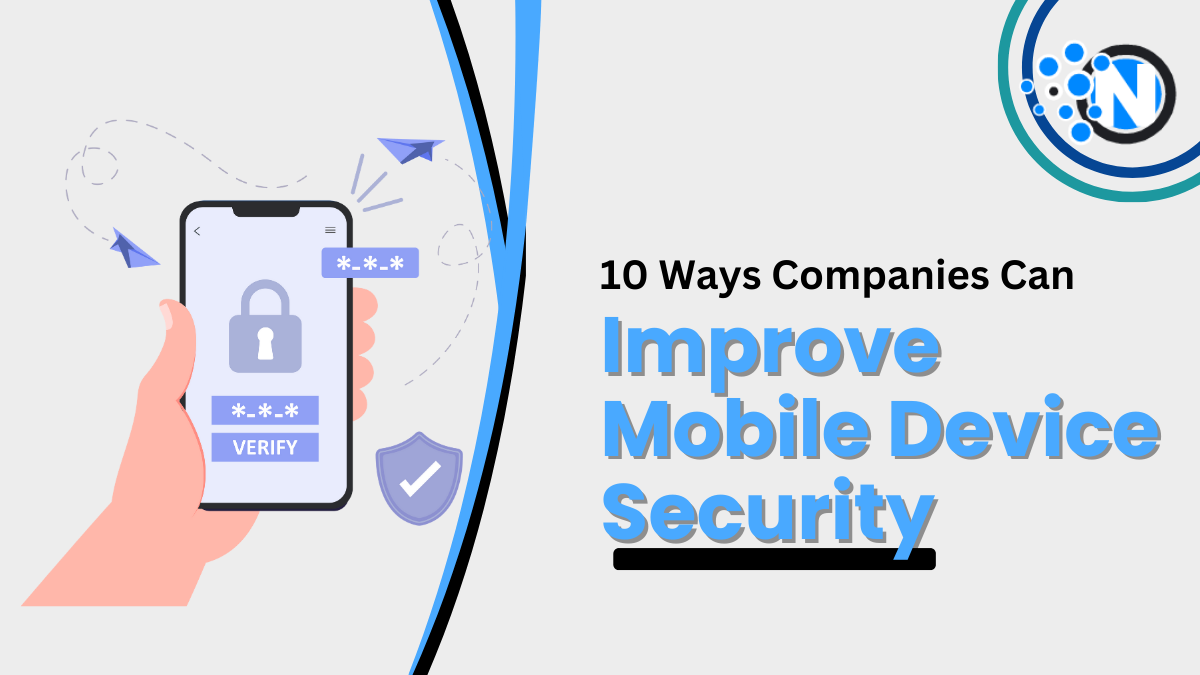10 Ways Companies Can Improve Mobile Device Security
Mobile devices are an integral part of daily lives in this digital age. From smartphones to tablet PCs, these portable gadgets provide us with greater convenience and connectivity for doing several personal and professional tasks. However, the need for robust security measures has also increased due to the rise in mobile device usage. Companies must prioritize mobile device security to protect sensitive data, maintain customer trust, and preserve their reputation among competitors.
Understanding the Mobile Device Security
Mobile device security is all about implementing practices and measures to protect employees’ mobile devices and their data from unauthorized access, theft, and other security concerns. The landscape of mobile device security is constantly evolving, and companies must stay updated with the latest security trends, vulnerabilities, and best practices to ensure a strong defense system against potential cybersecurity attacks.
Read Also: Smart Devices in the Workplace- Pros and Cons
The Importance of Mobile Device Security
Mobile devices usually store and access a lot of sensitive information, including personal data, financial details, and confidential business information. The outcomes of a security threat or breach can be dangerous, ranging from financial losses to reputational damage. That’s why businesses must recognize the importance of mobile device security and take proactive steps to enhance their security posture.
Best Practices for Improving Mobile Device Security
1. Strong Authentication Mechanisms
Implementing strong authentication systems could be the first line of defense in mobile device security at the workplace. Companies should encourage using security techniques like strong passwords, biometric authentication (like fingerprint or facial recognition), and two-factor or multi-factor authentication. These measures drastically reduce the risk of unauthorized access to mobile devices by avoiding unauthorized access.
2. Regular Software Updates and Patch Management
Keeping mobile device operating systems and applications up to date is necessary for addressing vulnerabilities and fixing security faults. Regular software updates and patch management should be a part of every company’s mobile device security policy. By quickly applying updates, business can reduce security risks through known vulnerabilities. Employees must update all their mobile devices to avoid security concerns and keep them safe.
3. Mobile Device Management (MDM) Solutions
Mobile Device Management solutions offer centralized control and management capabilities for mobile devices within an organization. MDM solutions enable companies to enforce security policies, remotely wipe or lock devices in case of loss or theft, and monitor device usage. Deploying a robust MDM solution can help companies ensure consistency and security across their mobile device fleet.
4. App Security
Mobile apps play a vital role in the functionality and productivity of mobile devices. However, not all apps are developed equal for security. Companies should adopt strict guidelines for app usage, allowing only trusted and verified apps to be installed on corporate mobile devices. Regular app security measurements and app examination can help identify and mitigate potential risks. They must ask employees to install trusted apps from App stores to avoid issues.

5. Employee Education and Awareness
Employees are often the weakest link in the security policy. Providing comprehensive training and education programs on mobile device security is vital for businesses in this digital world. Employees should be aware of the potential security risks, best practices for secure device usage, and the importance of reporting any suspicious activities to the concerns. By adopting a mobile security-conscious culture, companies can minimize the probability of security incidents.
6. Data Encryption
Data encryption is necessary to protect sensitive information stored on mobile devices. Companies should enable encryption for both device storage and data transmission. Data encryption ensures that the data remains unreadable and unusable if a device is compromised or falls into the wrong hands. As a business, you must invest in a reliable data encryption solution to ensure all your business data and information is safe in case of a device loss or failure.
7. Secure Network Connectivity
Mobile devices are vulnerable to attacks when connecting to public Wi-Fi or other external networks. To reduce these risks, companies should encourage using secure networks or virtual private networks VPNs to establish secure connections. VPNs encrypt network traffic, protecting sensitive data from eavesdropping and unauthorized access.
8. Incident Response and Monitoring
An effective incident response plan is essential for timely detection, containment, and resolution of security incidents. Companies should implement monitoring tools and processes to identify suspicious activities, alert security teams, and enable quick remediation actions. Regular audits and security assessments can help identify vulnerabilities and improve incident response capabilities to keep mobile device attacks at a minimum.
9. Enable Remote Tracking and Wiping
Mobile devices are highly portable, making them prone to loss or theft. Companies should enable remote tracking and wiping capabilities to minimize the risk of sensitive data falling into the wrong hands. By leveraging device tracking solutions, businesses can locate lost devices and take necessary actions to recover or remotely wipe their data. This feature is particularly valuable in preventing unauthorized access and protecting confidential information.
10. Conduct Regular Security Audits and Penetration Testing
Regular security audits and penetration testing are integral in this digital era to assess the effectiveness of security measures and identify potential vulnerabilities. Companies can proactively identify mobile device security infrastructure flaws by conducting comprehensive audits and taking necessary remedial actions. Penetration testing involves simulated attacks to identify vulnerabilities and validate the effectiveness of security controls. These tests help organizations stay one step ahead of potential threats and ensure a robust security posture.
Conclusion
Mobile device security is an ever-evolving challenge for companies. Organizations can significantly enhance their security posture and protect sensitive data by adopting proactive measures and following best practices. From strong authentication mechanisms to employee education, every aspect of mobile device security plays a vital role in safeguarding company assets and maintaining customer trust. Embracing a comprehensive mobile device security strategy ensures companies can thrive in the digital landscape while minimizing security risks.





